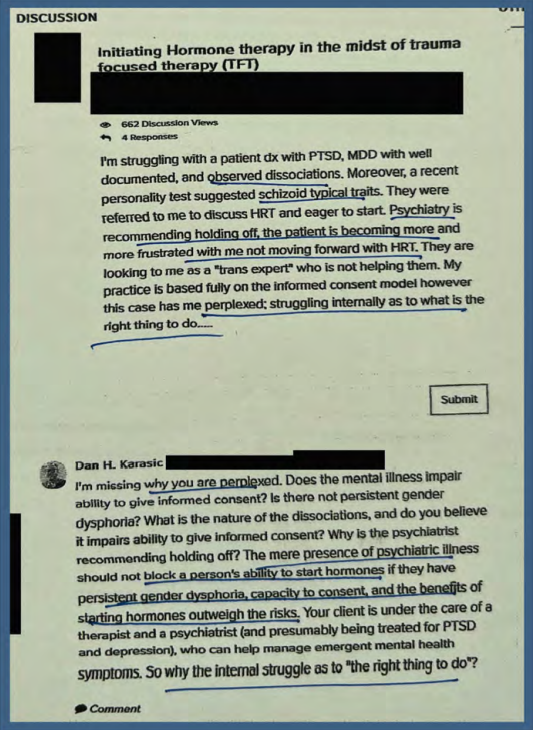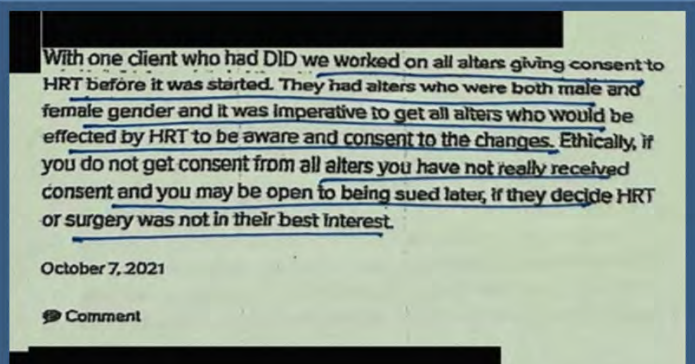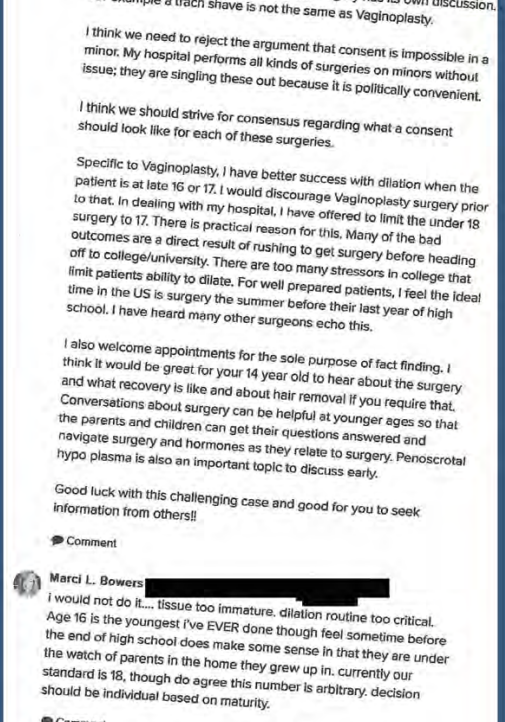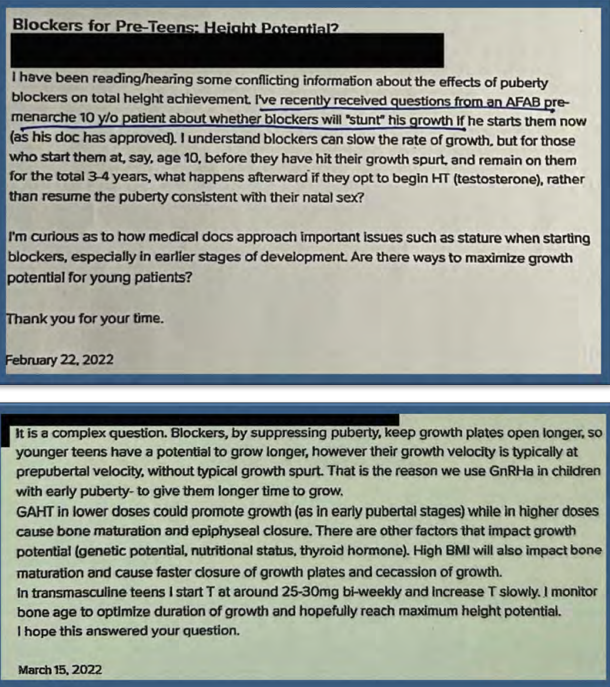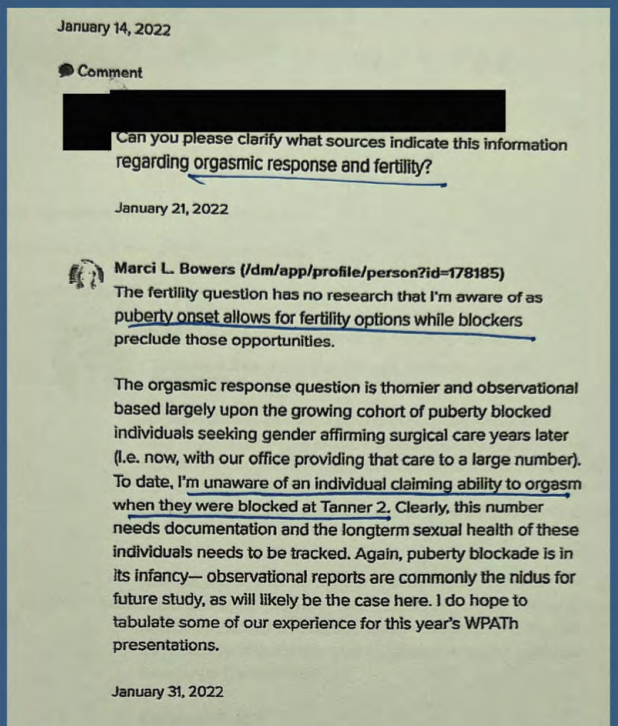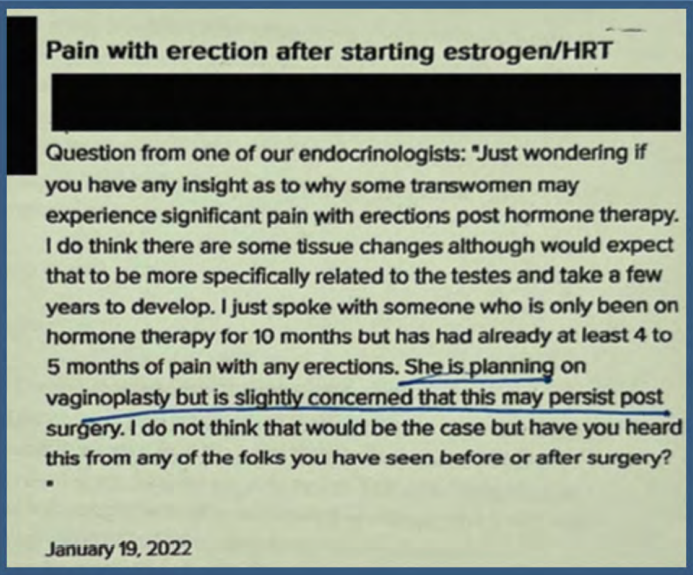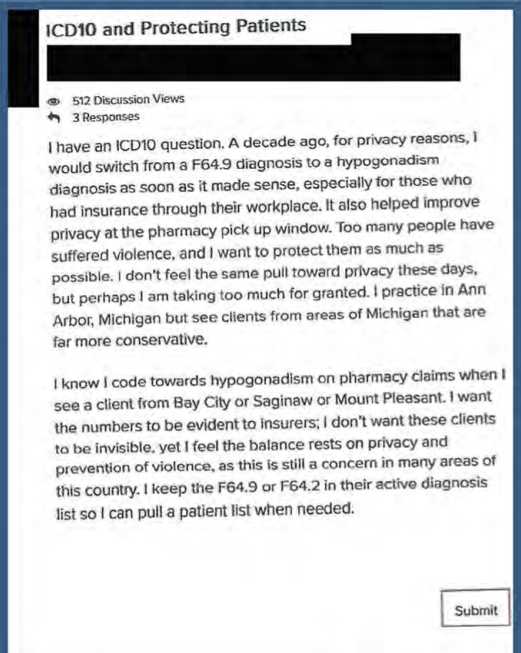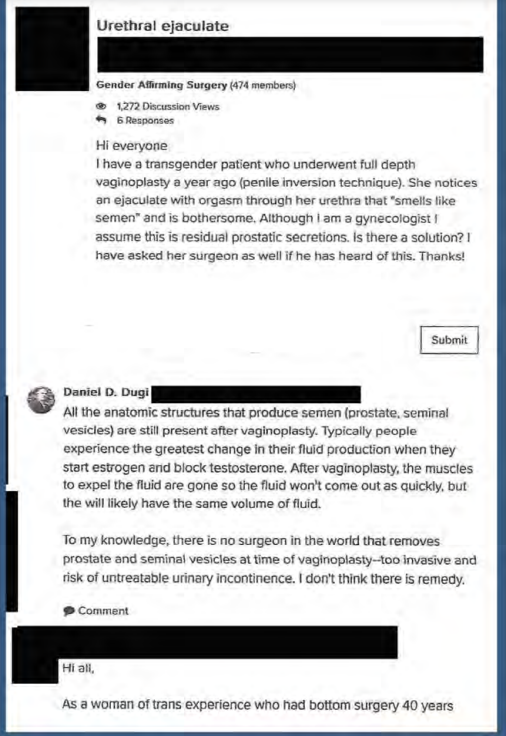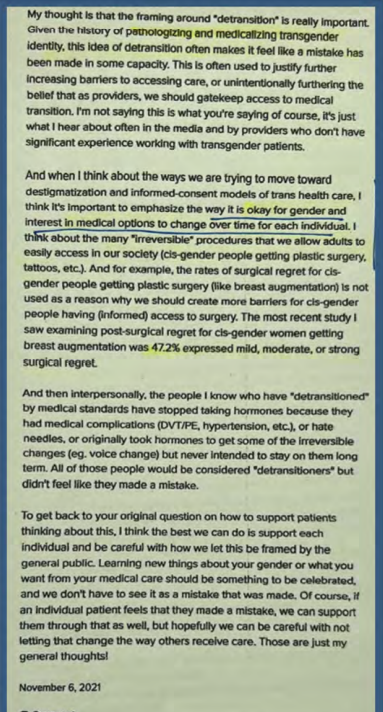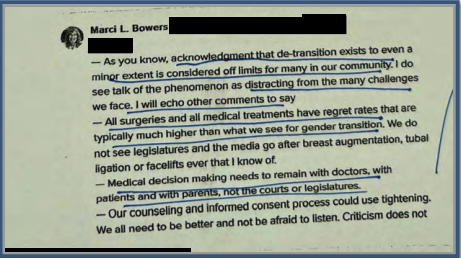by Tyler O’Neil
Doctors at the World Professional Association for Transgender Health repeatedly struggled with various side effects of what they call “gender-affirming care,” including cancer in teens, reduced sexual function, and the lack of informed consent for procedures with lifelong impacts, newly unearthed documents reveal.
WPATH, a controversial organization that transgender advocates and health agencies use to justify “transgender” medical interventions, frames itself as the leading expert organization on medical care for people who identify as transgender. It has faced criticism for advocating experimental practices that ignore serious concerns about informed consent and long-term side effects.
Journalist Michael Shellenberger released a report, “The WPATH Files,” through his nonprofit Environmental Progress Monday night. In the files, doctors and other medical professionals at WPATH struggle with serious medical issues that underscore the idea that the “transgender” hormones and surgeries euphemistically referred to as “gender-affirming care” represent a Wild West of experimental medicine.
Shellenberger told The Daily Signal that the files reveal “their whole paradigm falling apart over the last three years.”
“I’m relieved the files are out in the world for everyone to read,” he added. “Nobody can claim to understand the gender issue without reading the WPATH Files.”
When asked what most shocked him in the files, Shellenberger responded, “That the WPATH members and leaders spoke so frankly about not getting informed consent from their patients.”
Informed Consent
Environmental Progress published video footage of an internal WPATH panel called “Identity Evolution Workshop” held on May 6, 2022. Panel members admitted that it is impossible to obtain proper informed consent from young patients.
Dr. Daniel Metzger, a Canadian endocrinologist, noted that doctors find themselves “often explaining these sorts of things to people who haven’t even had biology in high school yet.” He noted that patients seem to want to pick and choose the physical effects of hormone therapy, like obtaining a deeper voice but getting no facial hair, or taking estrogen without developing breasts.
Metzger added, “It’s always a good theory that you talk about fertility preservation with a 14-year-old, but I know I’m talking to a blank wall. They’d be like, ‘Ew, kids, babies—gross.’”
“I often see people who have already engaged in some sort of medical intervention,” one panelist said. She admitted, “It’s out of their developmental range sometimes to understand the extent to which some of these medical interventions are impacting them.”
Critics often note that children can barely understand the idea of sacrificing their ability to have children later in life, and this discussion suggests WPATH members know this.
“Most of the kids are nowhere in any kind of brain space to really talk about it seriously.”
One WPATH member says, “It's out of their developmental range sometimes to understand the extent to which some of these medical interventions are impacting them.”
“We try to talk about… pic.twitter.com/cn1Q0YvhXF
— Michael Shellenberger (@shellenberger) March 5, 2024
On WPATH discussion boards, many of the doctors and therapists referenced patients with dissociative identity disorder, a disease in which a person has multiple personalities. One doctor wrote about “struggling internally” between giving a patient with “observed dissociations” the so-called cross-sex hormones the patient wants or following an “informed consent model” and holding off, as psychiatrists recommend.
California psychiatrist Dan Karasic responded, “The mere presence of psychiatric illness should not block a person’s ability to start hormones if they have persistent gender dysphoria, capacity to consent, and the benefits of starting hormones outweigh the risks.”
One WPATH member warned that “it was imperative” to obtain consent from each of a dissociative person’s alternate personalities (referred to as “alters”) in order to provide cross-sex hormones. “Ethically, if you do not get consent from all alters, you have not really received consent and you may be open to being sued later, if they decide [hormone therapy] or surgery was not in their best interest,” a medical professional wrote.
Surgeries on Minors
Plastic surgeons wrote about performing surgeries on minors.
Plastic surgeon Dr. Christine N. McGinn admitted to having “performed about 20 vaginoplasties in patients under 18 over the past 17 years,” and said she was “battling my hospital for the ability to continue to do so.” (“Vaginoplasty” refers to the process of altering male genitalia to appear like female genitalia.)
One surgeon recommended vaginoplasty no earlier than 16 years old, writing, “I feel the ideal time in the U.S. is surgery the summer before their last year of high school.”
Some medical professionals asked about whether so-called puberty blockers would stunt a young person’s growth. An endocrinologist (hormone doctor) recommended increasing cross-sex hormones slowly in order to allow a female patient to “hopefully reach maximum height potential.”
California gynecologist Marci Bowers admitted that “puberty blockade is in its infancy.”
Unpleasant Side Effects
Doctors and therapists mentioned how women who undergo “gender-affirming care” to identify as men have pain during sex and suffer uterine atrophy.
WPATH members also discussed that men who take estrogen to identify as women experience pain during erections.
When men experience such pain, testosterone cream can give them some relief, but the doctors warn that this relief may bring “unwanted androgenic effects,” i.e., making males who wish to appear female actually appear more male.
Doctors mentioned using false medical codes for prescriptions to shield patients from any scrutiny, assuming that pharmacies or insurance companies might refuse to dispense or cover the drugs if they knew the true reason for them. Rather than using the code for gender identity disorder, F64.9, doctors would put a “hypogonadism diagnosis,” falsely claiming that the patient had a disease where the body does not produce enough of a specific hormone.
A gynecologist wrote about a male patient who underwent a vaginoplasty but who still secreted a fluid that “smells like semen.” Other doctors explained that males who undergo this process will always secrete fluid in this way, even though it no longer contains sperm. “I don’t think there is [a] remedy,” one wrote.
Dismissing Detransition
While WPATH members knew about detransitioners, people who formerly underwent experimental interventions to make their bodies resemble those of the opposite sex but who later decided to reverse these processes and embrace their biological sex, they repeatedly insisted that detransition does not mean the original transgender identity—or the gruesome medical interventions to confirm it—represented a mistake.
“I think it’s important to emphasize the way it is okay for gender and interest in medical options to change over time for each individual,” one WPATH member wrote in November 2021. The member insisted that detransitioners “didn’t feel like they made a mistake.”
Bowers, the California gynecologist, noted, “acknowlegment that de-transition exists to even a minor extent is considered off limits for many in our community.” She insisted that “all surgeries and all medical treatments have regret rates that are typically much higher than what we see for gender transition.”
Others called “the idea of detransitioning” problematic because “it frames being cisgender as the default, and reinforces transness as a pathology.”
Cancer Risk
Doctors also admitted that cross-sex hormones can cause liver cancer in teenage patients.
In December 2021, a doctor sought advice about “the development of hepatic adenomas in a young person treated with testosterone and/or oral contraceptives.” Hepatic adenomas, uncommon liver lesions, appear in otherwise normal-appearing livers.
The doctor mentioned a 16-year-old female patient who had been taking testosterone for a year and who developed “two liver masses,” which “the oncologist and surgeon both have indicated that the likely offending agents are the hormones.”
Another WPATH member mentioned a female friend who developed “hepatocarcinomas”—liver cancer—after “about 8-10 years” of testosterone use. “It was so advanced that [the female who identified as male] opted for palliative care and died a couple months later.”
Environmental Progress noted that female patients have developed liver cancer from cross-sex hormones. In 2020, the medical journal The Lancet published a study of a 17-year-old girl with a large hepatocellular carcinoma, the most common type of primary liver cancer, after she had been on testosterone for 14 months. Researchers also documented a 47-year-old woman who identified as a man and who had contracted a rare cancer of the bile duct that normally only appears in advanced age.
Many states have moved to ban “gender-affirming care” for minors, largely due to concerns that minors cannot consent to experimental treatments that may leave them stunted, scarred, and infertile. Florida has moved to exclude such “treatments” from Medicaid funding.
The World Professional Association for Transgender Health did not respond to The Daily Signal’s request for comment by publication time.
– – –
Tyler O’Neil is managing editor of The Daily Signal and the author of “Making Hate Pay: The Corruption of the Southern Poverty Law Center.”


